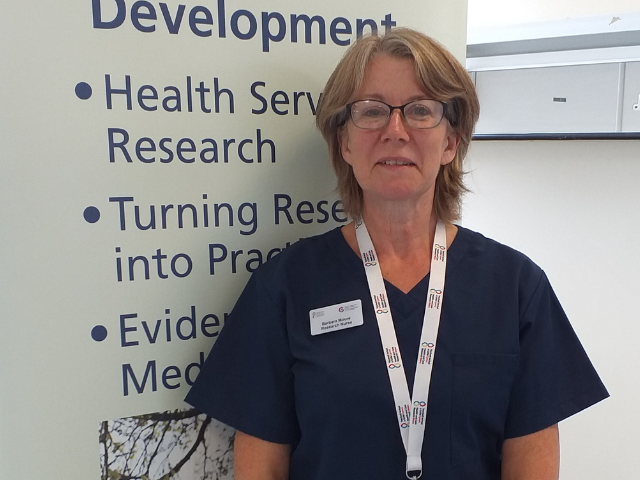
Using my skills in the race to find a vaccine
Barbara Moore, Senior Public Involvement Manager, at Health and Care Research Wales, writes about her experience working with participants in the Oxford University vaccine trial and the importance of including the public voice in shaping how research is conducted.
Two years ago, I relented my nurse registration and as I entered 2020, retirement was approaching.
Then, came the pandemic.
My colleagues and I, at Health and Care Research Wales, were asked to list our skills to support frontline staff, which for me included my clinical skills. I was also invited by the Nursing and Midwifery Council to have my registration reinstated.
Being asked to volunteer for redeployment as a research nurse at a site that was going to recruit frontline staff to the Oxford COVID-19 vaccine study was a ‘no brainer’. After all, many members of my family were working on the frontline: one of my sons is a paramedic and my daughter is a midwife and Health Visitor, so if I had useful skills I wanted to use them in the race to find a vaccine.
At the same time, there was a huge amount of work happening to support the prioritisation of COVID-19 research in Wales. The response to the pandemic was rapid.
For me and my team, that meant ensuring a fast-track process for public involvement and for the public to be involved in the design and conduct of COVID-19 research as early as possible.
The Welsh public involvement community were fantastic responding to requests at very short notice and adapting to the virtual world. Even so, we were hearing rumbles that COVID-19 research was being developed at such a pace with the wrong assumption that there was no time to involve the public in shaping the research.
As I stepped away from my usual job, I completely trusted my fantastic team who would hold the fort. It was a critical time for everyone.
Working at a rapid pace behind masks
In May, I joined forces with amazing colleagues from a south Wales health board and Public Health Wales to screen and recruit hundreds of remarkable frontline staff. With guidance from Oxford, we socially distanced and protected the potential participants through the screening and vaccination process.
Although we had to work at a rapid pace behind masks, gloves and aprons I was in the privileged position of being able to listen to their needs and concerns.
Previously, I developed a deep passion for the participant’s voice being heard in shaping research during my time working in cancer care and research in the 90s. Now, here I was being reminded first-hand of the importance of public involvement in the design and conduct of research – the answer to the question posed in the study is absolutely dependent on participants taking part and making sacrifices.
We were talking to all manner of people who had personal harrowing stories and motivations to be taking part but we also needed to relay complex information and undertake screening procedures to ensure they were eligible, all in a short space of time.
Clear importance of the public's voice
It may seem a simple process to recruit healthy frontline staff to a vaccine study but in these unprecedented times the importance of the public’s voice to help shape how the research is conducted, to achieve successful recruitment and follow up of participants, was clear.
I am currently returning once a month for the follow up clinics, while in my day job there is now a UK-wide fast-track service to increase public involvement and improve what we experienced at the start of the pandemic.
The journey to find an effective vaccine continues. Demand is still high for public involvement in COVID-19 studies and other studies are restarting. But the public’s role in the search for a vaccine is not over.
When I qualified as a nurse in the 1970s in London, I could never have predicted that almost 50 years later I would be helping to find a solution to a global pandemic. I’ve listened to many patient and public stories during my career, and I believe we should always take time to hear their voices."
Barbara Moore is Senior Public Involvement Manager, at Health and Care Research Wales.
Find out more about taking part in research.
First published on the National Institute for Health Research (NIHR) website, November 2020.